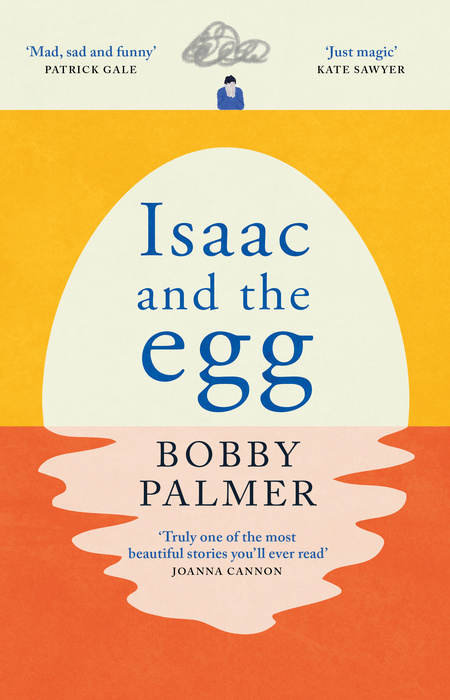A peculiarly awful thing happens when someone you love deeply dies.
Suddenly a world that made sense, that had order and purpose, that had joy, and yes, sometimes sadness and angst because what life doesn’t, isn’t any of those things anymore.
It just suddenly ISN’T.
What do you do with something that cataclysmic happening to you? The thing is we usually don’t do much at all, plunging into a fugue state of nothingness where none of the old rules or certainties apply, and all you know, when you are brave to acknowledge your feelings at all which are terribly BIG and SAD, is that the person you loved, that you LOVE, is gone.
Bobby Palmer captures this horrible, brutal, desperately sad and purposeless shift in the stark realities of life so profoundly beautifully in his debut novel, Isaac and the Egg, that it feels like someone has reached deep down into your soul, pulled out all the pain and lostness and grinding sense of grief unparalleled and put it on the page with words that sing and are eloquently insightful and wondrously empathetic.
If this makes it all sound bleak to the point of nihilistic oblivion, fear not, for what he also does is paint a picture of someone emerging, very slowly and almost against their will, back into the world around them, hesitantly reengaging with people and places and things for whom there is no longer a road map or any clear of working out what to do, say or be next.
“All good kids’ stories start with a journey into the woods, but Isaac’s story isn’t for children. He’s too old to be raised by wolves, too large to tumble down a rabbit hole, too jaded to be tempted into a gingerbread house. His happy ending has been and gone. Isaac hesitates, glancing back at his car. As if on cue, he hears the screams again. There’s pain in it, and it’s painfully familiar. Without so much as a second glance, Isaac launches himself into the undergrowth.” (P. 7)
To even give away a hint of the astoundingly imaginative narrative of Isaac and the Egg would be to ruin the journey into its gloriously soul excoriating wonders but suffice to say, Palmer has crafted what feels like almost all the time you’re reading it, like the definitive guide to what grief feels like.
It can’t be completely definitive of course because grief is wholly and utterly different for every person, which includes the book’s protagonist Isaac Addy, a late-twenties illustrator of children’s books and other things, who suddenly finds his world upended when tragedy befalls him.
While we are expected in such situations to cry for a little while and to retreat from the world, what is never said and what you don’t realise until searing grief strikes you, is that there is a time limit on raw, unfettered, uncomfortable (for those around you, anyway although it’s not a bundle of fun for you either) and that after an unspecified period, you are supposed to bounce back and tell everyone “I’m sad but getting better, thank you.”
But if that doesn’t happen, and let’s face it, it almost never does; that kind of approach to grief is all about people finding a way they can live with someone else’s grief which is never palatable to be around because it reminds us, and we hate this, that death happens.
The problem with Isaac Addy is that he can’t pretend; he can’t just flick a switch, walk out the door, go to the shops and smile at people in a sad but hopeful because that’s not how he feels.
He feels SAD beyond all reason, bereft in ways he can’t even begin to articulate, or even remember half the time, and he has no way of knowing how to escape the labyrinth of grief in which he has found himself.

That is until he walks into the woods one day on what is undoubtedly the worst day of a life that doesn’t feel like it’s ever going to get any better, and finds his existential scream of neverending pain answered by something that sounds as lost as he is.
What follows this moment that Isaac does not expect on a morning that was expected to go very much differently, is the stuff of such poignant and rich imagination, such devastatingly intense and hilariously endearing, that there’s no way you can walk away from Isaac and the Egg without feeling like someone has taken the very essence of the human experience and writ it large on pages that feel less like they make up a book, though they make a very fine, funny and moving one and more like make a piece of the worst but slowly hopeful moment of your life made into a magnificently moving story.
It is no small thing to have a book impact like Isaac and the Egg undoubtedly will.
Many books leave their mark; how can they not? You journey with characters through events big and small, all the time privy to their hopes, dreams, fears and loss, and come out the other side with a resolution good or bad that re-defines life for that character forever after.
And if you have an open heart, and pretty much all readers do, it changes you too.
“Isaac Addy might be an alien. He certainly feels like one. Apart from Joy’s flying visit and his sessions with Dr Abbass, he’s barely interacted with anyone of his own kind in months. He looks like one, too. What did Isaac Addy look like last year, before he zapped all his human friends away? Not like this. This, whatever this is, is as alien as can be. His stalagmite hair and stalactite beard make him seem like he’s from a world where the inhabitants are made of stone. His eyes used to sparkle, but now they shine only as much as two polished pebbles one would find on a beach. Isaac has hardened, calcified.” (P. 165)
Somehow Isaac and the Egg goes even further.
As Isaac comes to grips with what he finds in the forest, and as a result with the lost state of a life brought to ruin by grief, he has to ask himself what it is he wants from it going forward.
That’s a tough question to ask in such a place because it involves examining what has been lost (desperately painful), what is left (diminished and uncertain) and what might lie ahead (honestly, does anything?) and dragging yourself, with the help, love and support of others, to the beginning of the rest of your life.
If that sounds like a lot, it is, and for all its magicality and whimsy and sheer endearing funniness at times, Isaac and the Egg doesn’t attempt, not once, to sugarcoat how utterly hard that whole journey is, and how even if something happens to you to begin reshaping things, which it most certainly does to Isaac Addy, that it’s not some overnight fix.
That kind of stuff only happens in certain kinds of books and movies, and while they are wonderful and necessary offering escapist loveliness that gives a finger in the nice candy-coated of ways to life’s blisteringly hard realities, Isaac and the Egg is not that kind of story.
It is real and honest and very sad, but it is also slowly and wondrously hopeful, hesitantly but certainly alive with possibility and all too aware that when we are lost in the dark miasma of grief, that it doesn’t look there is any way out; but there is, and Isaac and the Egg, in ways too special and imaginative to detail (the entire premise is one big spoiler that you must discover for yourself), will strike your heart just so in a way that speaks to you, shows you, holding our hand as it does so, taking us on a journey, as it does Isaac, that we will not soon forget and which will not leave us unchanged.
